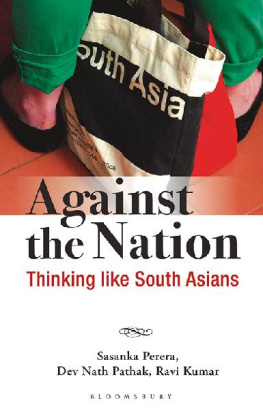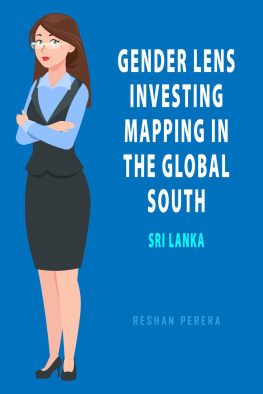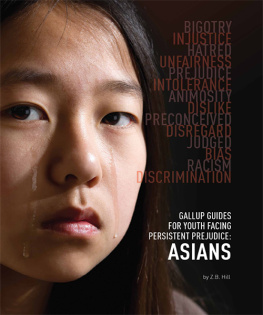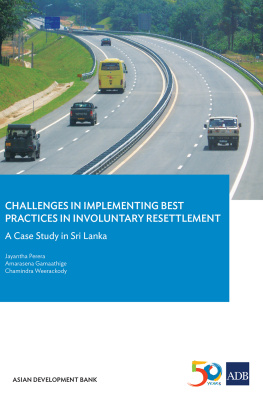Against the Nation
Against the Nation
Thinking Like South Asians
Sasanka Perera
Dev Nath Pathak
Ravi Kumar
BLOOMSBURY INDIA
Bloomsbury Publishing India Pvt. Ltd
Second Floor, LSC Building No. 4, DDA Complex, Pocket C 6 & 7,
Vasant Kunj New Delhi 110070
BLOOMSBURY, BLOOMSBURY ACADEMIC INDIA and the Diana logo are trademarks of Bloomsbury Publishing Plc
First published in India 2019
This edition published 2019
Copyright Sasanka Perera, Dev Nath Pathak, Ravi Kumar, 2019
The authors have asserted their right under the Indian Copyright Act to be identified as Authors of this work
Bloomsbury Academic
An imprint of Bloomsbury Publishing Plc
All rights reserved. No part of this publication may be reproduced or transmitted in any form or by any means, electronic or mechanical, including photocopying, recording, or any information storage or retrieval system, without prior permission in writing from the publishers
Bloomsbury Publishing Plc does not have any control over, or responsibility for, any third-party websites referred to or in this book. All internet addresses given in this book were correct at the time of going to press. The author and publisher regret any inconvenience caused if addresses have changed or sites have ceased to exist, but can accept no responsibility for any such changes
ISBN: HB: 978-9-3886-3022-1; eBook: 978-9-3886-3024-5
Created by Manipal Digital Systems
2 4 6 8 10 9 7 5 3 1
Typeset in Minion Pro by Manipal Digital Systems
Printed and bound in India by Thomson Press Pvt Ltd
Bloomsbury Publishing Plc makes every effort to ensure that the papers used in the manufacture of our books are natural, recyclable products made from wood grown in well-managed forests. Our manufacturing processes conform to the environmental regulations of the country of origin.
To find out more about our authors and books visit www.bloomsbury.com and sign up for our newsletters
Perera, Pathak and Kumar have rescued the idea of South Asia from its statist straitjacket and infused it with a new and rich cultural meaning. Their imaginative essays collectively beckon a better future for a beleaguered subcontinent.
Sugata Bose
Gardiner Professor of History, Harvard University
This volume represents the first serious attempt to move beyond an artificial and policy-driven definition of South Asia. By analysing the many ways in which the region has assumed an autonomous cultural, intellectual, political and economic reality, the authors have lent it a strategic and historical weight that points towards a new kind of future for its peoples.
Faisal Devji
Professor of Indian History, University of Oxford
Weaving together myth, folklore, art and politics, this volume views the region from the perspective of an experiment in transnational cooperationThe South Asian University. It is probably unique in that it locates the academic programmes of the University at the heart of the discussions on the region. It is an important contribution by a group of sociologists to the study of a region that tends to be dominated by political scientists and defence analysts.
Roma Chatterji
Professor of Sociology, Delhi School of Economics, University of Delhi
Geographical regions are evolving and unfolding entities, not only politically and strategically, but also in all other human manifestations. South Asia is no exception as it remains both radically vibrant and soothingly conservative. This volume is an unconventional and bold attempt at revisiting and reimagining South Asia in all its diverse perspectives. The attempt is timely and refreshing. It will intellectually stimulate and empower the readers at the same time.
S.D. Muni
Professor Emeritus, School of International Studies
Jawaharlal Nehru University, New Delhi and
Former Ambassador and Special Envoy, Government of India
In the age of nation, nationalism and nationhood, becoming a South Asian or practicing South Asianness is no easy task. This is as much an issue of physical boundaries as it is of the boundaries of the mind, indeed, nurtured zealously by the state and society in the different countries of South Asia and beyond. Yet, South Asianness is very much a part of the civilisational quest of the people of this region. It may not have found its expression in politics and hardly celebrated in the corridors of power, but it is ripe in music, gastronomy, film, travel, art, myth and in the manifold ideas of South Asia. This book will interest both proponents and sceptics of South Asia, not only in understanding or inversely nullifying the viability of South Asianness in the future, but also in flagging its strength and weaknesses in the past. And to do this, the authors of this book have made an effort to coalesce the empirical and the non-empirical, knowing well that only a post-disciplinary approach could create knowledge without borders and make us think like South Asians for the peace and prosperity of the people of South Asia.
Imtiaz Ahmed
Professor of International Relations and Director
Centre for Genocide Studies, University of Dhaka
Contents
The overall expectations, approach and the politics of this book are clearly spelled out in our introductory note, which we have called, Beginnings. But at the most fundamental level, this collection of chapters can be understood as an attempt to explore South Asia beyond the state and nation-centric approaches that predominate the academic and policy discourses at present. We find these approaches both stale and extremely limiting, and would not offer a broader perspective to comprehend South Asia in a nuanced manner with reference to its multi-layered complexities. Instead, we have attempted to find other ways to understand South Asia by privileging culture. By culture in this context, we mean myth, folklore, travel, memory, visual and performing art, politics, pedagogic innovations and so on. In this sense, this book is not merely a cartography of what we think is possible, but also an invitation to other like-minded colleagues and friends to consider seeing the region differently.
This book has been possible due to a number of often unplanned as well as planned intersections of personal and collective histories and institutional arrangements. Our ability to collaborate on a number of intellectual projects including this book was made possible because of our accidental meeting in 2011 as the result of all of us coming to South Asian University. That is, we came to the university to establish an institution of higher learning, literally from scratch, from different educational, cultural and political backgrounds, but with sharable academic and intellectual interests. This is despite our individual differences in pedagogic approaches, ideas of political intervention and politics more generally. We have never tried to erase any of these differences, and some of these differences and personal positions come to the fore in what we write. In this sense, without South Asian University providing the kind of intellectual forum and space it has, for relatively unburdened thinking at a time when the public sphere is shrinking, this book would not have been possible.
We are also very thankful to our students from different parts of South Asia who have taken us on guided tours of their cultural and social worlds and into the discourses of their political dilemmas and upheavals, allowing us a first-hand look at what they have seen up close, which we had missed. The intellectual and sometimes emotional encounters with them in the classroom and beyond have provided some of the core building blocks that have made this book possible.









